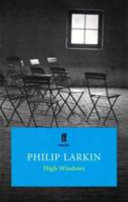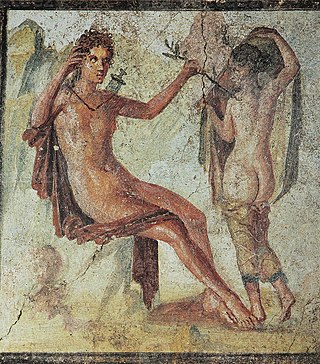Analysis and reception
"Ovid in the Third Reich" is one of Hill's most famous poems. [12] It has led to different readings and interpretations and has been criticised for being more ambiguous than necessary. The scholar E. M. Knottenbelt says it appears both lucid and intentionally ambiguous and is among the poems by Hill that have baffled readers the most. [2]
According to Knottenbelt, "Ovid in the Third Reich" portrays Ovid as a disillusioned man in a godless world, aware of the uselessness of appealing to a belief in God, love—in the conception of the Latin word caritas—or ignorance amid brutality. [2] Knottenbelt says the second quatrain can be read as if Ovid has learned not to despise the damned because that judgement is reserved for God. He says it also can be read as a decision not to indulge in a self-destructive despair and instead contemplate the suffering of the damned, tying in with a Christian tradition. [13] According to Knottenbelt, the very last lines add complexity by contrasting the exorcising of despair, which makes the subject capable as a poet, with the isolation caused by his dedication to lyrical poetry. This indicates a failure to be compassionate and may pit him against the world. [14] Michael Wood reads the poem as a statement about the proximity between the damned and the rest of humanity, which also might be damned. [15]

Christopher Ricks interprets "Ovid in the Third Reich" as a poem about Germans who remained politically neutral or silent during the Nazi period, saying "what can be said for ... [and] must be said against them". [16] David Bromwich says the opening line about work and family mimics clichés used after the fall of the Third Reich when ordinary people tried to distance themselves from the regime. [17] He says "Ovid in the Third Reich" is about "the necessity of judging" [18] and that a possible contrast between the first quatrain, which is more apologetic, and the second, which is more judgemental, makes it possible to interpret them as coming from two different persons. [19] Daniella Jancsó cites Bromwich and says the poem is "unparalleled" in its disillusionment about the reveration of poets, presenting Ovid as a petty bourgeois man who talks like a politician in his attempt to escape responsibility, despite knowing he is not innocent. [20] William Wootten associates "Ovid in the Third Reich" with a wave of literature and cinema which, inspired by the Eichmann trial of April 1961, was concerned with the average person during the Third Reich. He say it reads like "a classic reaction to Eichmann", [21] but due to its publication in February 1961, it cannot have been inspired by the trial itself. Wootten says it may comment on—or participate in—the publicity ahead of the trial. [22]
Knottenbelt says interpretations that emphasise ordinary people are insufficient and misleading. He says "Ovid in the Third Reich" is written as a "poet's poem" and stresses that the main character is not an average citizen but Ovid, the famous writer of elegiac love poetry, who has been placed in a setting where he does not belong: an ancient pagan in the Christian Nazi Germany. [14] Knottenbelt says Ovid's life during the "totalitarian" Roman Empire adds more uncertainty to the poem; Ovid was banished from Rome late in his life, but the epigraph is from Amores, one of his early works. [14] Knottenbelt places significance on the fact that Hill chose "Ovid in the Third Reich" as the opening poem of King Log, a collection concerned with the autonomy of poetry. [14] He interprets it as an examination of Hill's earnest conviction of poetry's autonomy, and his fears about the moral evasiveness this may amount to. [23]
The scholar Lennart Nyberg uses "Ovid in the Third Reich" to exemplify Hill's poetic technique where otherwise insignificant phrases become language acts: this happens when the poem uses the words "things happen" to imply atrocities and guilt. [12] Theodore Ziolkowski interpreted the poem by describing Hill as "a full-fledged member of the skeptical generation". [1] Hill's goal, according to Ziolkowski, was to separate poetry from politics by participating in a perennial battle between, on one side, beauty and order, and, on the other, temporal history and power. Hill here defended a fragile innocence. [1] Ziolkowski said the sceptical stance of the poet in "Ovid in the Third Reich", who celebrates love and innocence, is simultaneously presented as a form of political complicity. [3]















